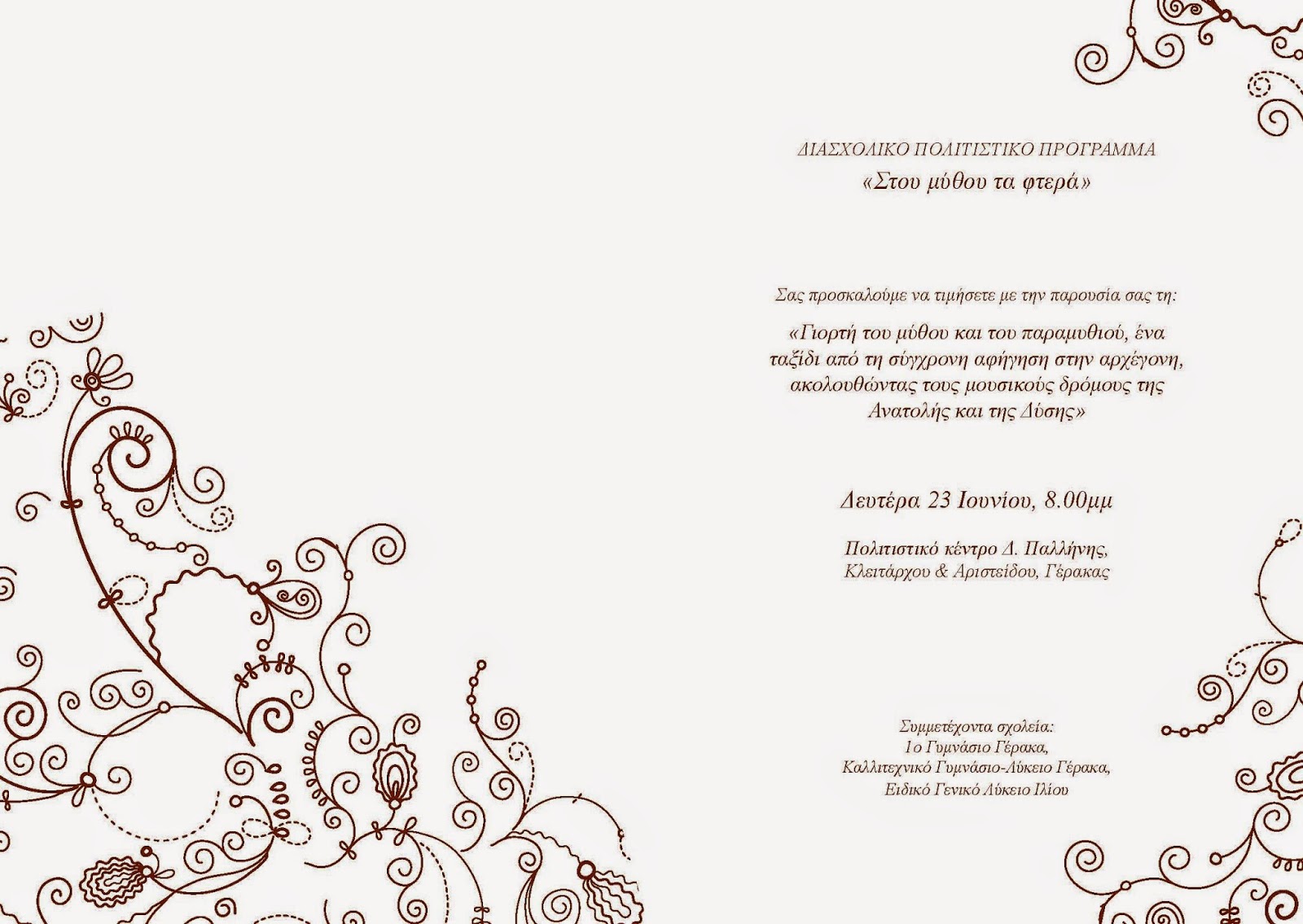Στου
Μύθου τα φτερά.
Η Πολιτιστική δημιουργία των 3 Σχολείων (Α' Γυμν. Γέρακα,
Καλλιτεχνικού Γυμν. - Λυκείου Γέρακα και Ειδικού Λυκείου Ιλίου) ολοκληρώθηκε μετά από κοπιαστική προετοιμασία μιας σχολικής χρονιάς με μια εκδήλωση ξεχωριστή στο Πολιτιστικό Κέντρο του Γέρακα.
Η σκηνοθετική καθοδήγηση έγινε αφιλοκερδώς από τον κ. Τάκη Λουκάτο
Η σκηνοθετική καθοδήγηση έγινε αφιλοκερδώς από τον κ. Τάκη Λουκάτο
Συγχαρητήρια σε όλους.
Στο video, το finale της εκδήλωσης. «Παραμυθένια
αγάπη» Βαλς της Πόλης σε στίχους Βάσιας Γερμανού. Χορεύουν μαθητές από τα τρία
σχολεία. Διδασκαλία χορού από τη Νικολέτα Νικολάου
Τρώες (Κ. Π. Καβάφης)
Απαγγέλλει ο Ανδρέας Προφύρης, μαθητής Β' τάξης από το Ειδικό Λύκειο Ιλίου. Χορευτικό, Βαλεντίνη Μαρκουλάτου από το Καλλιτεχνικό Λύκειο Γέρακα. Μουσική συνοδεία πιάνου από τη καθηγήτρια του Καλλιτεχνικού Λυκείου Γέρακα κ. Φιλιππίνα Κρεμμύδη
Τρώες
Είν' η προσπάθειές μας, των συφοριασμένων·
είν' η προσπάθειές μας σαν των Τρώων.
Κομμάτι κατορθώνουμε· κομμάτι
παίρνουμ' επάνω μας· κι αρχίζουμε
νάχουμε θάρρος και καλές ελπίδες.
Μα πάντα κάτι βγαίνει και μας σταματά.
Ο Aχιλλεύς στην τάφρον εμπροστά μας
βγαίνει και με φωνές μεγάλες μάς τρομάζει.—
Είν' η προσπάθειές μας σαν των Τρώων.
Θαρρούμε πως με απόφασι και τόλμη
θ' αλλάξουμε της τύχης την καταφορά,
κ' έξω στεκόμεθα ν' αγωνισθούμε.
Aλλ' όταν η μεγάλη κρίσις έλθει,
η τόλμη κι η απόφασίς μας χάνονται·
ταράττεται η ψυχή μας, παραλύει·
κι ολόγυρα απ' τα τείχη τρέχουμε
ζητώντας να γλυτώσουμε με την φυγή.
Όμως η πτώσις μας είναι βεβαία. Επάνω,
στα τείχη, άρχισεν ήδη ο θρήνος.
Των ημερών μας αναμνήσεις κλαιν κ' αισθήματα.
Πικρά για μας ο Πρίαμος κ' η Εκάβη κλαίνε.
Κ. Π. Καβάφης
Παραδοσιακά τραγούδια της Πόλης από τον Γρηγόρη Κακούρη. Στο πιάνο η Φιλιππίνα Κρεμμύδη, Λαούτο ο Γιάννης Σεβαστόπουλος και στο Παραδοσιακό Βιολί ο Βασίλης Αθανασιάς
Η καθηγήτρια κ. Φιλιππίνα Κρεμμύδη στο αγαπημένο της πιάνο.
Η κ. Γερμανού στην "παραμυθένια αγάπη"
Ο Σκηνοθέτης της Παράστασης κ. Τάκης Λουκάτος μίλησε για την ξεχωριστή εμπειρία και αγάπη που εισέπραξε από τα παιδιά και των τριών σχολείων. 

Χαιρετισμός του Διευθυντή από το 1ο Γυμνάσιο Γέρακα (κ. Π. Δημαρά)
"Video" από το χαιρετισμό του κ. Δημαρά















 The road to the referendum
The road to the referendum







